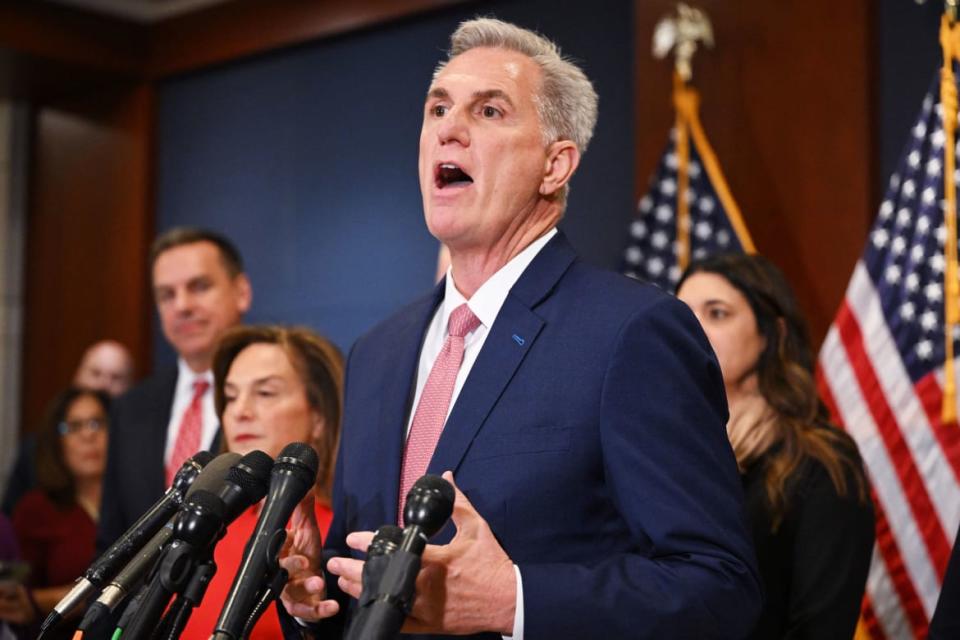The Next Congress Will Have Even More Election Deniers Than It Had on Jan. 6

- Oops!Something went wrong.Please try again later.
- Oops!Something went wrong.Please try again later.
For all the talk about Trump-endorsed election deniers losing races all over the country, that’s not the whole story.
Shockingly, given the message of moderation from voters in the midterms, there are 145 election deniers in the new Republican House caucus, six more than the 139 who objected to the counting of the 2020 votes in the current Congress. Their ranks are up in the Senate, too, with Trump courtiers winning in Ohio and North Carolina.
They are poised to have an outsized influence on the GOP in Congress, sowing chaos and weaponizing their power to exact concessions from hapless leaders who are too weak to hold them off, and too beholden to the former president to stand their ground against the MAGA invasion.
It Was a Pretty Good Election Night to Not Be MAGA
“Insurrectionists willing to be insurrectionists even after the violence of Jan. 6 makes you wonder what they want to do with that power if there’s another Trump candidacy. You have to hope they act responsibly, but they may not,” says Ned Foley, a law professor at Ohio State University who specializes in U.S. elections.
The lame duck session currently underway could be the last gasp of sanity before the craziness takes hold. Passing the Electoral Reform Count Act of 2022 is critical, says Foley, to prevent another Jan. 6 in 2025—should Trump or some other MAGA-backed candidate be unhappy with the outcome. The reform significantly raises the bar for legislators to lodge an objection, and it takes governors out of the equation, a reform that eliminates the risk posed if an election denier like Kari Lake took office.
“Arizonans know BS when they see it,” Lake tweeted after CNN called the governor’s race for Democrat Katie Hobbs.
Another critical item is raising the debt ceiling, which Republicans have said they will refuse to do unless the Biden administration agrees to scale back spending on the social safety net, raising the specter of potential default.

House Minority Leader Kevin McCarthy, R-CA, speaks after he was nominated to be House Speaker at the US Capitol in Washington, DC on Nov. 15, 2022.
Michael Thorning, director of governance with the Bipartisan Policy Center, says there is a “strong unified desire on the Democratic side” to avoid the game of political chicken that accompanies the unpopular but necessary action to pay the country’s bills. Republicans are reluctant to give up the leverage, but some do remember that during the Obama years, the brinkmanship caused the downgrading of U.S. credit. “Before that, everything was theoretical. We’re playing with live ammo here,” says Thorning.
It cost taxpayers $18 billion the last time the GOP held the debt ceiling hostage, recalls Norm Ornstein, a political scientist with the right-leaning American Enterprise Institute (AEI). “Election denier is shorthand for radical. Half of them have no clue of what the consequences are, and the rest are eager to blow everything up.”
If the debt ceiling is not raised in the lame duck session, then it will fall to the new Congress “and the odds of the right taking us off a massive economic cliff are frighteningly higher than zero,” says Matt Bennett with Third Way, a moderate Democratic group. “When you play political chicken, you need to be sure both parties know that a crash is a bad option. It is not clear to me that this group of MAGA Republicans is aware of that when it comes to a default.”
Kevin McCarthy, the likely next Speaker of the House, will have the smallest margin since 1932, when 17,000 war veterans and their families marched on Washington—as the Bonus Army—demanding the relief promised for their service in World War One. Dave Wasserman with the non-partisan Cook Political Report likened McCarthy’s slim majority to a “Marjorie”—given how beholden he will be to extremists like Rep. Marjorie Taylor Greene to secure his tenuous hold on power.
Pushing Total Bullshit Misinformation Is Not ‘Healthy Skepticism’ of the Powerful
McCarthy survived an early test in his caucus, but still faces weeks of dealmaking to secure the support he needs for the House floor vote in early January. “McCarthy is the weakest, most spineless, and most morally compromised leader I’ve seen in 50 years of being close to this process,” says Ornstein, who has written extensively about Congress, including his 2016 book, It’s Even Worse than it Looks.
Republican Tom Davis represented northern Virginia in the House from 1995 to 2008, chairing the NRCC (National Republican Campaign Committee) from 1998 to 2002. He told The Daily Beast there are “tricks of the trade” that McCarthy can use to win on the floor. If a handful of members—say between five and seven— abstain, that can bring the number needed for a majority of those present to below 218, and McCarthy has committee chairmanships he can promise away, plus there’s “the Trump card,” assuming the former president is willing to twist arms to get the man he has called “my Kevin” in place as Speaker.
“Everybody goes with their self-interest,” says Davis. “McCarthy knows where his caucus is. McCarthy needs Trump. If Trump pulls the rug out, he’s not Speaker. None of these guys likes Trump. Everybody acts in their own interest. They’re with Trump not out of fealty, it’s self-interest.”
Donald Trump and Mike Pence Launch the Political Comebacks No One Wants
Trying to explain how so many otherwise rational lawmakers have fallen into the grip of Trump and his Big Lie, Davis recalled pleading with Republican House members on Jan. 6, telling one who has a Ph.D. that objecting to the certification of the 2020 election “will brand you for life,” only to be told if he didn’t do this, he’d be primaried. Another GOP lawmaker did the right thing, in Davis’ telling, and when he was home in his district two days later, a woman came up to him, not to commend him but to say, “Do you think they learned their lesson?”
If the past is prologue, we can expect more of the same from the election deniers. What the midterms changed is the nature of the response. Republican media elites, principally Rupert Murdoch and The Wall Street Journal editorial board, are distancing themselves from Trump’s desperate bid to return to the White House. Democrats don’t have to be in a defensive crouch going into 2024.
When voters choose their next president, they will do so having seen for themselves how Republicans handle power in the new Congress. Voters want more than a clown show.
Get the Daily Beast's biggest scoops and scandals delivered right to your inbox. Sign up now.
Stay informed and gain unlimited access to the Daily Beast's unmatched reporting. Subscribe now.
